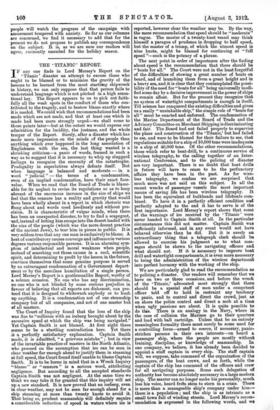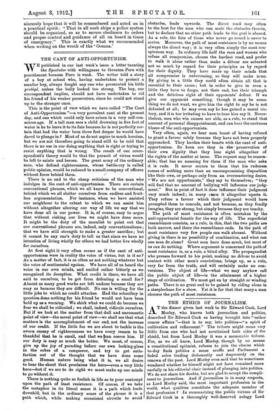THE TITANIC ' REPORT.
IF any one finds in Lord Mersey's Report on the Titanic' disaster an attempt to excuse those who ought to be blamed or to minimize the gravity of the lessons to be learned from the most startling shipwreck in history, we can only suppose that that person fails to understand language which is not pitched in a high sensa- tional key. The Report appears to us to pick out faith- fully all the weak spots in the conduct of those who con- tributed to the tragedy, and to bestow blame exactly where it is needed. We could wish that recommendations had been made which are not made, and that at least one which is made had been more strongly urged—we shall come to those points later—but at the outset we would express our admiration for the lucidity, the justness, and the whole temper of the Report. Surely, after a disaster which has made more impression on the minds of the people than anything which ever happened in the long association of Englishmen with the sea, the last thing wanted is a shrieking criticism—a panic of words, framed in such a way as to suggest that it is necessary to whip up sluggard feelings to recognize the enormity of the catastrophe. Prodigality in superlatives always defeats itself. But when language is balanced and moderate — in a word " judicial " — the terms of a condemnation, even of an implied condemnation, have their exact face- value. When we read that the Board of Trade is blame- able for its neglect to revise its regulations so as to keep abreast of the enormous increase in the size of ships we feel that the censure has a reality and gravity that would have been wholly absent in a report in which rhetoric was flung about and words used heedlessly and without pre- cision. It is characteristic of vulgar minds, when there has been an unexpected disaster, to try to find a scapegoat, and, instead of letting him escape into the desert loaded with the sins of the people (which was the more decent practice of the ancient Jews), to tear him in pieces in public. It is very seldom true that any one man is exclusively to blame. A host of contributory causes converge and influence in various degrees various responsible persons. It is an alarming sym- ptom of intellectual and moral weakness when people, instead of searching out those causes in a cool, scientific spirit, and determining to profit by the lesson in the future, convince themselves that some genuine purpose is served by an extravagant condemnation of a Government depart- ment or by the merciless humiliation of a single person. Lord Mersey's Report is a gentlemanlike Report, worthy of a solemn occasion. No one who has any discrimination, no one who is not blinded by some curious prejudice in favour of believing that all reports are dishonest, can pre- tend that it is designed to whitewash anybody or to hush up anything. It is a condemnation not of one steamship company but of all companies, and not of one master but of all masters.
The Court of Inquiry found that the loss of the ship was due to "collision with an iceberg brought about by the excessive speed at which the ship was being navigated." Yet Captain Smith is not blamed. At first sight there seems to be a startling contradiction here. Yet there is a perfectly satisfactory explanation. Captain Smith made, it is admitted, " a grievous mistake " ; but in view of the invariable practice of masters in the North Atlantic, who proceed on the assumption that ice can be seen in clear weather far enough ahead to justify them in steaming at full speed, the Court found itself unable to blame Captain Smith. It is to be borne in mind that in a Wreck Inquiry " blame " or " censure " is a serious word, attributing negligence. But according to all the accepted standards Captain Smith was not negligent. At the same time we think we may take it for granted that this inquiry will set up a new standard. It is now proved that an iceberg, even in clear weather, may not be seen far enough ahead for a ship steaming at more than twenty knots to avoid it. That being so, prudent seamanship will definitely require a considerable reduction of speed in waters where ice is reported, however clear the weather may be. By the way, the mere recommendation that speed should be "moderate" is vague. The master of a twenty-knot vessel may think himself a paragon of prudence in dropping to half speed, but the master of a tramp, of which the utmost speed is nine knots, might be blamed for continuing at "full speed "—such is the potency of a phrase.
The next point in order of importance after the finding about speed is the recommendation that there should be " boats for all." The Court were not in the least forgetful of the difficulties of stowing a great number of boats on board, and of launching them from a great height and in a heavy sea, and it is clear that they contemplated the possi- bility of the need for " boats for all" being universally modi- fied some day by a decisive improvement in the power of ships to remain afloat. But for the present they recognize that no system of watertight compartments is enough in itself. Till science has conquered the existing difficulties and given us a really " unsinkable ship," the simple rule of "boats for all" must be enacted and enforced. The condemnation of the Marine Department of the Board of Trade and the Advisory Committee on Merchant Shipping is discriminating and fair. The Board had not failed properly to supervise the plans and construction of the Titanic,' but had failed to see, and were to be blamed for their failure to see, that regulations suitable for a ship of 10,000 tons were inadequate in a ship of 40,000 tons. Of the other recommendations, those which refer to boat-drill, to a continuous service of wireless telegraphy, to the calling together of an Inter- national Conference, and to the policing of disaster are very important. There is no doubt that boat drills in future will have to cease to be the perfunctory affairs they have been in the past. As for wire- less telegraphy, we confess we are surprised that much more was not said on this subject. In all the recent wrecks of passenger vessels the most important means of saving life has been wireless telegraphy. It has been the equivalent of bulkheads and lifeboats com- bined. To have it in a perfectly efficient condition and perfectly adapted to the end it has to serve is of the first importance. Lord Mersey's report shows that some of the warnings of ice received by the Titanic ' were never handed to Captain Smith at all. In the particular circumstances this did not matter. Captain Smith was sufficiently informed, and in any event would not have behaved otherwise than he did. But it is surely an extraordinary thing that a telegraph clerk should be allowed to exercise his judgment as to what mes- sages should be shown to the navigating officers and what should not. If it is necessary to improve boat drill and watertight compartments, it is even more necessary to bring the administration of the wireless department into perfect harmony with the working of the ship.
We are particularly glad to read the recommendation as to policing a disaster. Our readers will remember that we have on two or three occasions, and before the wreck of the Titanic,' advocated most strongly that there should be a special staff of men under a competent officer told off to hold in restraint any tendency to panic, and to control and direct the crowd, just as on shore the police control and direct a mob at a time when ugly passions are about. It is quite possible to do this. There is an analogy in the Navy, where in the case of collision the Marines go to their quarters and load with ball cartridge. Unless that be an entirely meaningless formality there must surely be some need for a controlling force—armed to coerce, if necessary, panic- stricken persons in their own interests—on board a passenger ship, where the people are mostly without training, discipline, or knowledge of seamanship. In one company, we believe, it has already been decided to appoint a staff captain in every ship. The staff captain will, we suppose, take command of the organization of the passengers, of the boat crews, and so forth, while the captain of the ship has command of the officers and crew for all navigating purposes. Some such delegation of authority has become absolutely necessary in a large modern ship. The master can no longer make his personality, much. less his voice, heard froln stem to stern in a crisis. There is more than a manageable ship's company under him—. there is a population ; and the ship is as intricate as a small town full of winding streets. Lord Mersey's recom- mendation is expressed in the following words, and we
sincerely hope that it will be remembered and acted on in a practical spirit : " That in all such ships a police system should be organized, so as to secure obedience to orders and proper control and guidance of all on board in times of emergency." This is exactly what we recommended when writing on the wreck of the Oceana.'





































 Previous page
Previous page